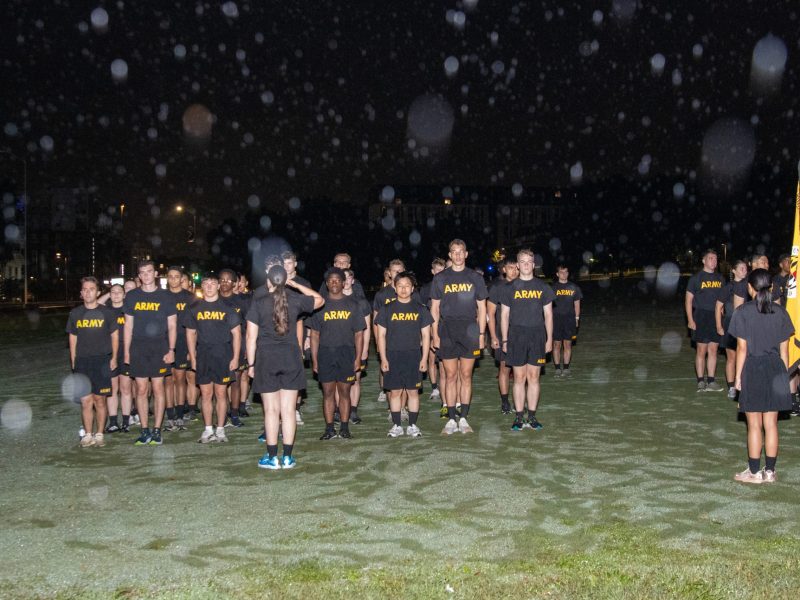A few weeks after the Terrapin men’s basketball team fell in the second round of the 2007 NCAA Tournament, Landon Milbourne walked into Gary Williams’ Comcast Center office.
The veteran coach had a pretty good idea what was coming next.
When a young player who finished the season buried on the depth chart averaging one point per game stops by unannounced, it’s natural to start reaching for the transfer release forms.
This time, Milbourne surprised Williams with a more palatable query. Roughly, “How do I get better?”
In truth, the now-senior forward thought through his options before stopping by Williams’ office to chat about everything from what parts of his game needed the most work to where he should train over the summer. In the end, Milbourne, who now laughs about catching Williams a bit off-guard with his positive attitude, knew where he wanted to be.
Nearly three years later, it is easy for both parties to talk about the visit. With 94 starts and 1,043 more points since then, Milbourne has long been a key cog in the Terp machine. But lessons learned in that first season continue to push Milbourne as his career in College Park winds down.
Just the second player in ACC history to top the 1,000-point mark for his career after scoring fewer than 20 points as a freshman, Milbourne’s continued improvement has earned him a spot in Terps’ history as a hardworking, versatile leader and on NBA general managers’ radars.
“I wanted to be here,” Milbourne said of his attitude after his freshman season. “I wasn’t really thinking about trying to leave. I was more trying to establish myself as a starter on this team and figure out what I had to do to get that spot.”
Before ever earning a reputation across the ACC for his work as a tough, undersized power forward, Milbourne spent his first year doing mostly scout team work, trying to improve a talented core of big guards that included seniors D.J. Strawberry and Mike Jones.
Following a successful senior season on a star-studded Oak Hill Academy squad, Milbourne showed flashes of talent as a freshman with the Terps, including a memorable highlight-reel slam against St. John’s at Madison Square Garden. Even now, Milbourne bristles at the suggestion that he simply “disappeared” as the season went on.
But, as classmates Greivis Vasquez and Eric Hayes began their ACC education, he largely stayed on the bench. Milbourne logged one minute or less in the Terps’ final 12 games and didn’t play at all in their two NCAA Tournament contests.
“I knew he was going to be a good player,” said Strawberry, who described Milbourne as his “little brother.” “He just needed the opportunity,” he said. “I told him to wait for his chance.”
The last three years have been about making up for that lost time.
Milbourne said Williams didn’t promise him playing time, but outlined the keys to success in his program. The 6-foot-7, 205-pounder earned a role as a starting small forward, at first. That one-point-per-game freshman scoring average — one of his coach’s most-referenced statistics throughout this season — jumped to 8.2 points per game in his second season.
Still, progress was incremental.
“I look back at my sophomore year, and it was kinda like my freshman year — just getting used to the pace, getting used to the different ways to score and play defense,” Milbourne said. “It was more of a learning experience for me.”
Last year, a lack of big men forced him into his present power forward position. More slow progress followed as he adapted to life inside. Milbourne talks freely about watching himself on tape and laughing as he tried to take the ball through players several inches taller and in most cases, much heavier.
Those associated with the program consistently say Milbourne’s toughness and determination got him through those matchups. Milbourne is quiet, and he said he’s fine being overshadowed by Vasquez. But his impact on his teammates is clear.
“Landon doesn’t really stop,” forward Dino Gregory said. “I’ve never saw him, like, slow down before in my life. He’s the Energizer Bunny out there.”
These days, those outside the program have noticed the hard work, too. In the past year, he’s started to appear on mock draft boards.
NBA general managers would likely expect Milbourne to play small forward or possibly even guard at the next level, but Aran Smith, president of NBADraft.net, calls Milbourne “a good tweener” thanks to his experience inside and athletic ability on the perimeter.
Smith said it’s hard to measure Milbourne’s biggest asset as a guy who could possibly contribute right away off the bench doing the little things.
“When you’re building a team, you need those glue guys,” Smith said. “You need guys that can do the dirty work, and I think he can be one of those guys. I’m intrigued with him.”
But to continue to warrant that attention, Milbourne must show he can hold up over a full season. Last year, Milbourne acknowledges that at this point, his body was “done.” In a recent interview, he said he was feeling good — probably boosted by the emergence of freshman forward Jordan Williams, who has taken some of the inside load that undersized center Dave Neal couldn’t handle last year.
But Milbourne is averaging 6.9 points per game in the Terps’ last eight contests. Up to that point, Milbourne averaged 14.4 points for the season.
In a teleconference Monday, Gary Williams acknowledged Milbourne is “tired” and has relished the break between regular season and postseason.
As Milbourne’s career winds down, he’s had trouble putting it into perspective, but mostly because he’s not ready to.
The forward said his parents repeatedly tell him he’ll appreciate his statistical improvement down the road.
“Once you start thinking about those type of things you kinda get a little selfish and you start going on your own,” said Milbourne after a recent Terps’ practice. “That’s just not who I am.”
For now, he’s focused on being a “leader” — a word he uses copiously but pridefully when discussing his on-court achievements — down the postseason stretch.
Unlike the last time the Terps’ postseason hopes looked this promising, Milbourne knows he’ll be playing. Now, while maybe a little tired, the Georgia native is relishing his opportunity.
Before the Senior Night game against Duke last Wednesday, Gary Williams was asked to evaluate each of his seniors through their four years.
Naturally, Gary Williams’ mind jumped to that meeting, when he expected to lose his athletic young small forward.
Instead, Milbourne became a readymade example for what patience in Williams’ program can accomplish.
“He coulda transferred,” Williams said. “He coulda done anything after that freshman year because he didn’t play much. He chose to work hard and fight for playing time, and he’s turned out to be a very good player here at school.”
edetweiler@umdbk.com


